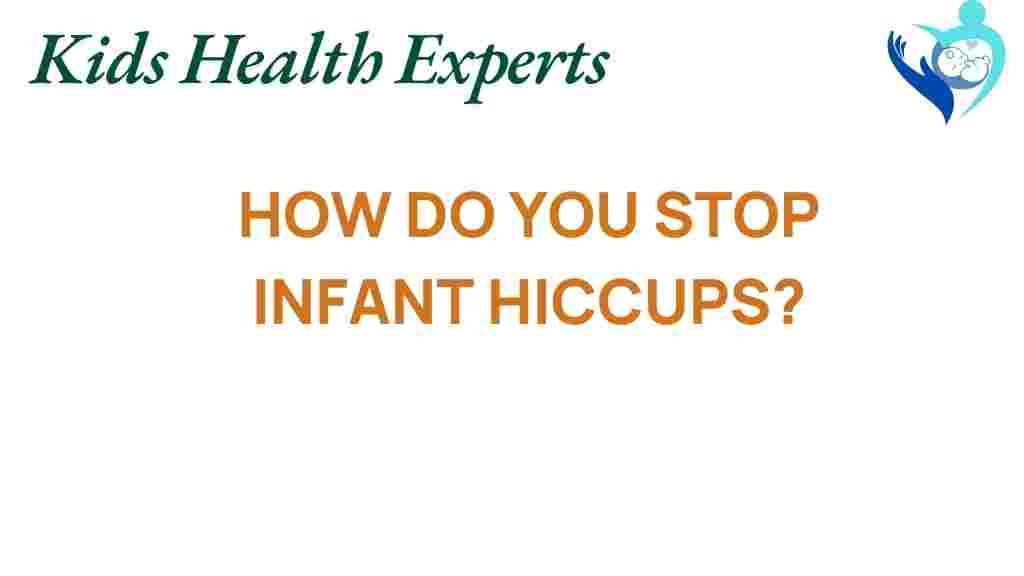Unraveling the Mystery: How to Stop Infant Hiccups Effectively
Every parent has been there: you’re cradling your little one, and suddenly they start hiccupping. Infant hiccups are a common occurrence, often leaving new parents puzzled and concerned. While hiccups are typically harmless, understanding how to soothe them can make a significant difference in your baby’s comfort and your peace of mind. In this article, we will explore various remedies, soothing techniques, and parenting tips to help you manage infant hiccups effectively.
What Causes Infant Hiccups?
Before diving into remedies, it’s essential to understand what causes infant hiccups. Hiccups occur when the diaphragm—a muscle that helps with breathing—contracts involuntarily. This contraction is followed by a sudden closure of the vocal cords, which produces the characteristic “hic” sound. Here are some common reasons for infant hiccups:
- Feeding habits: Overfeeding or feeding too quickly can cause air to be swallowed, leading to hiccups.
- Gastroesophageal reflux: This condition can irritate the diaphragm and trigger hiccups.
- Temperature changes: Sudden changes in temperature, such as moving from warm to cool environments, may lead to hiccups.
- Excitement or stress: Just like adults, babies can experience hiccups due to excitement or stress.
Remedies for Infant Hiccups
When it comes to treating infant hiccups, there are several effective remedies you can try. Here’s a step-by-step guide to help you soothe your baby’s hiccups:
1. Change Feeding Position
Adjusting your baby’s feeding position can help reduce the likelihood of hiccups. Hold your baby in a more upright position during feedings to minimize air swallowing.
2. Burp Your Baby
Regular burping can help release trapped air in your baby’s stomach. Try burping your infant after every 2-3 ounces of milk or when switching breasts during breastfeeding.
3. Use a Pacifier
Offering a pacifier can help relax your baby’s diaphragm and may stop the hiccups. Sucking can be soothing and can help regulate breathing.
4. Try a Gentle Tummy Massage
A gentle tummy massage can aid digestion and help relieve hiccups. Use your fingertips to make circular motions on your baby’s tummy in a clockwise direction.
5. Give Small Sips of Water
If your infant is old enough (usually around six months or older), offering small sips of water may help. This can help calm the diaphragm and stop hiccups.
Soothing Techniques for Hiccups
In addition to the remedies mentioned above, there are several soothing techniques you can use:
1. Swaddling
Swaddling your baby can provide a sense of security and comfort. It may help them relax and ease hiccups.
2. Create a Calm Environment
Sometimes, simply creating a calm and quiet environment can help your baby relax and stop hiccups. Dim the lights and reduce noise to create a soothing atmosphere.
3. Hold Your Baby Upright
Holding your baby upright against your chest can help relieve hiccups. The pressure on their diaphragm may assist in calming the spasms.
4. Distract Your Baby
Engaging your baby with toys, sounds, or gentle movement can serve as a distraction, potentially soothing them out of hiccups.
Parenting Tips to Prevent Hiccups
While hiccups are often unavoidable, there are several parenting tips you can adopt to reduce their occurrence:
- Feed Smaller Amounts: Instead of larger feedings, offer smaller amounts more frequently to minimize the risk of overfeeding.
- Choose the Right Nipple: If bottle-feeding, ensure the nipple size is appropriate for your baby’s age to prevent them from sucking in too much air.
- Monitor Temperature: Keep your baby’s environment at a comfortable temperature to avoid sudden changes that might trigger hiccups.
- Stay Calm: Babies can pick up on your stress. Remaining calm while addressing hiccups can help soothe your little one.
Health Concerns Related to Infant Hiccups
While infant hiccups are usually harmless, there are instances when they can indicate a health concern. It’s essential to consult your pediatrician if:
- The hiccups persist for an extended period (more than 30 minutes).
- Your infant shows signs of distress or discomfort during hiccups.
- Hiccups are accompanied by vomiting or other digestive issues.
- The frequency of hiccups increases significantly.
For more information on when to seek pediatric advice, visit this resource.
When to Seek Pediatric Advice
If you notice concerning signs or symptoms related to your baby’s hiccups, it’s crucial to reach out for professional advice. A pediatrician can help determine if there’s an underlying issue affecting your baby’s digestive health. Keep a log of your baby’s hiccup episodes, noting their frequency, duration, and any accompanying symptoms to provide valuable information during your visit.
Conclusion
Infant hiccups are a common and typically harmless part of babyhood. Understanding the causes and remedies can empower parents to soothe their little ones effectively. By employing the right techniques and being mindful of feeding habits, you can help reduce the frequency and intensity of hiccups.
Remember, if hiccups persist or are accompanied by other concerning symptoms, don’t hesitate to consult your pediatrician. Your baby’s health and comfort are paramount, and with the right approach, you can navigate the mystery of infant hiccups with confidence.
For more parenting tips and baby care advice, check out our comprehensive guide on baby care techniques.
This article is in the category Care and created by KidsHealthExperts Team
